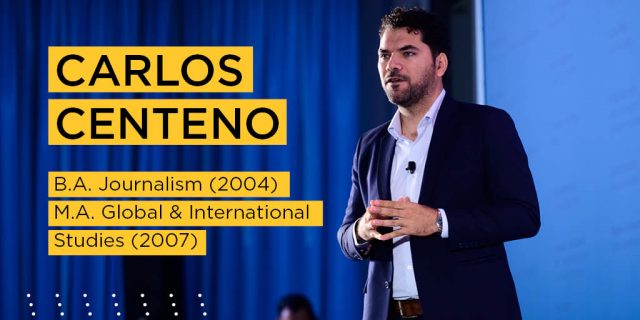
Why Carlos is a Hawk to Watch:
When disaster strikes, we count on rapid responses, and carefully reasoned plans, from those with the experience, expertise and steady-handedness to get right to the heart of the matter during high-stress scenarios.
From climate change and weather emergencies to food scarcity and financial inequality, the most complex and consequential issues facing the modern world demand both prompt action and increasingly advanced, data-driven solutions. A tall order perhaps, but Carlos Centeno, whose accomplishments include emergency ops, tech startup coaching, artificial intelligence, and — of course — a KU degree, has always been up for a challenge.
Although data and policy analysis, and business model reviewing features, have figured heavily into his daily tasks, it’s the outcomes and human implications of his work, first and foremost, that drive Carlos’ efforts. At the United Nations World Food Programme (WFP), he provided humanitarian aid by helping the organization feed almost 90 million people in 83 countries each year, serving in refugee camps, tribal areas, and migrant crisis settings across the globe. Now at MIT Solve in Cambridge, Massachusetts, he’s leading efforts to bring together leaders in academia, private and public sectors, and non-profits to explore innovative tech solutions that spark major change in communities on a global scale.
Meet Carlos, our September Hawk to Watch. Learn how skills he developed in KU’s journalism and global & international studies programs have transferred into his multifaceted career, and discover how he’s bringing his curiosity about people and their stories to his work today.
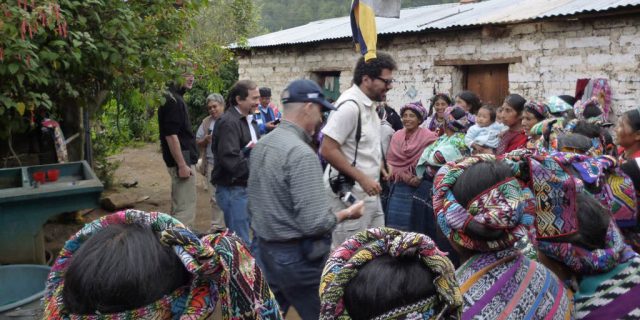
Tell us in a few sentences what you do for a living:
For 8 years I designed and managed projects in areas prone to natural disasters, where we worked with communities and governments to plan preparedness and recovery activities. I also worked in a few emergency operations. Now I work at MIT Solve, where I lead the economic prosperity community, engaging leaders in tech, non-profits, academia to support solutions to the world’s greatest challenges.
MIT Solve is an initiative of the President of MIT that advances lasting solutions from tech entrepreneurs to address the world’s most pressing problems. Solve is a marketplace for social impact: we find tech entrepreneurs from around the world and broker partnerships across our community to scale their innovative work — driving lasting, transformational change.
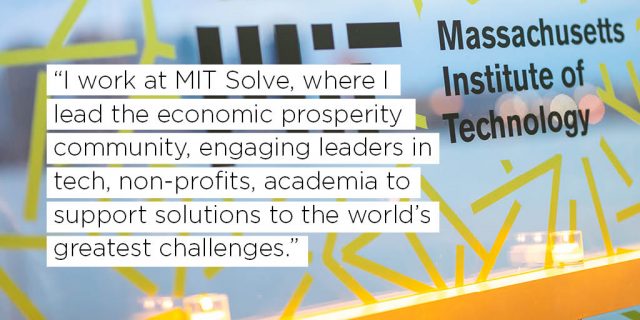
How did you end up doing what you do? Was there a certain moment when things came together? Or was it a longer journey?
I started as an idealist, thinking that I should do what I love. I learned that this is a good driver for anyone because few of us know what we want when we are fresh out of college. We may think we know what we want but it’s not until you try it out and give it a serious go that you stick to it as something you love.
I always had this fascination growing up in Caracas (Venezuela), looking up at the middle class and poor class neighborhood buildings, when mom or dad would drive us home from school, and thinking, “What is that family doing right now? Are they fighting? Do they have enough money? Are they laughing and cooking?” I think that’s where that curiosity that is the ultimate expression of journalism was sparked. But I went from that passion for journalism into a different kind of career: I backpacked throughout South America with the money I saved DJing at bars in Lawrence, to understand what I wanted to do with my degree. I wanted to be in remote places, talking to people who were not as present in the media.
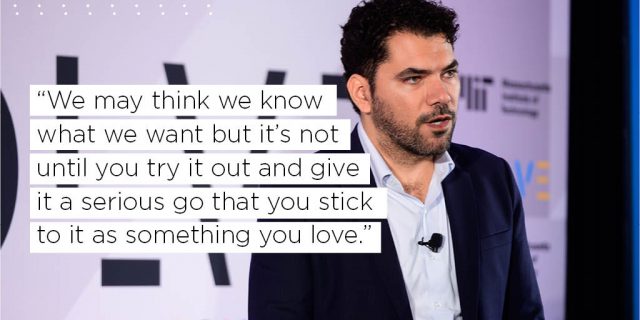
I was interested in the roots of violence, and I was interested in music. But after my trip I realized I wanted to do things other people wrote about, not write about them.I think there was a lot to be done and I didn’t think I could get my hands dirty quickly enough through reporting.
In the end, I settled on working in the humanitarian field. There’s a wonderful quote by Howard Thurman, who influenced MLK a lot. It set me at ease with my work at the United Nations (UN), because as a junior officer you feel like you don’t know what you’re doing, because there’s no humanitarian school (despite what some schools offer): “Don’t ask yourself what the world needs. Ask yourself what makes you come alive and then go do that. Because what the world needs is people who have come alive.”
What made me come alive was listening to stories that few people heard and telling those stories (This is when I was in the highlands of Ethiopia for example, with farmers who had lived here for 10 generations). It just happened to be a different format than journalism, and I think, very rewarding. Talking to communities and staying in those areas for months to figure out their needs, like a reporter, and then being able to get all the pieces in place to run a massive program to address those needs is everything I didn’t know that I wanted and it was the perfect combo of J-School and global and international studies.
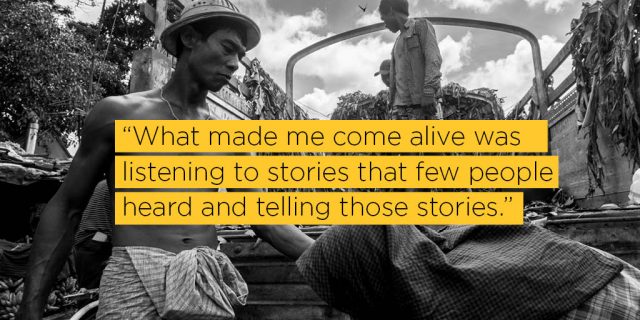
Tell us more about your transition to MIT Solve.
MIT Solve was a natural transition for me. I was looking at other ways of solving the challenges we identified with communities every time we spent weeks planning with them and their governments and it was not only hard to solve comprehensive issues with UN-specific mandates but also without that capacity to try things that the UN had never tried before. While the World Food Programme (WFP) is doing a great job with their Accelerator, it takes the grit and resilience of small startups to prove how something can be done differently to gradually change the outlook of whole communities. I’ve seen a few people accomplish this at the UN and it has been exceptional when it’s done and usually involves going outside what’s expected or working with unexpected organizations.
I wanted to be in a dynamic environment where people with ideas could get the support needed to take them to scale, and part of that is being at MIT. It’s a wonderful place to create. So I’m excited to not only do that at Solve but also next year as a Visiting Fellow at MIT Sloan School of Business researching the intersection of tech and fragile contexts like migrant paths, refugee camps etc.
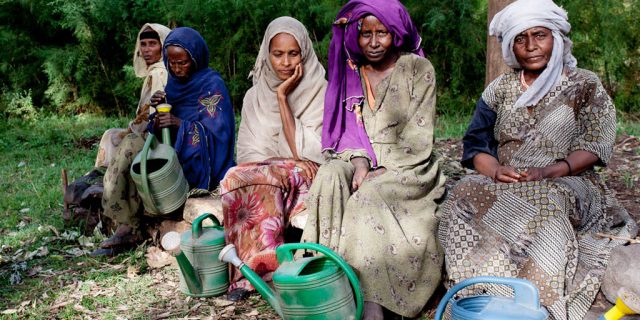
What do you feel is your biggest achievement so far?
That’s a tough one. I always think of achievements as something I did with somebody else. One of those was reinventing the way a massive organization like WFP did project design to focus on fixing chronic issues, engaging communities directly and focusing on livelihoods through satellite imagery, data analysis, community planning and a bit of anthropological work.
WFP has come a long way from the days of sending food to address a hunger crisis. We worked on guidance for years and tested it out with several divisions in-house and in remote rural communities. It was the first time I was part of something so comprehensive with such a brilliant team of humanitarian legends. By the time I left that unit we had received $1 million in grants to spread the methodology. My prototype project ALIA, even as I work at MIT now, is the natural progression of this achievement, automating these processes for emergencies so the humanitarian community can support a quicker, better informed response. The teams that worked on the guidance pre-tech are now working on this with a lot of enthusiasm.
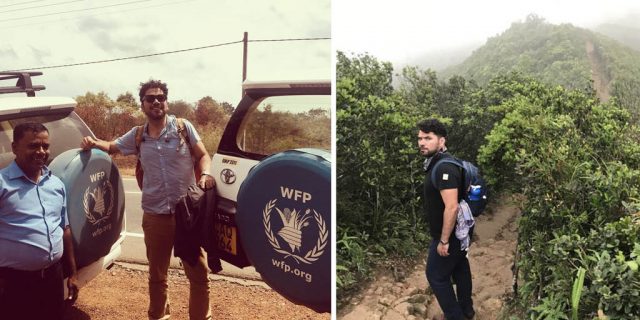
What’s your lowest career moment and how did you pick yourself up and move on?
I prepared with a team of 25 brilliant humanitarian responders for a humanitarian crisis that I cannot name. We worked on many scenarios 7:00 AM to midnight, including weekends for two months. In the end, we were not able to enter the country and a lot of people are still suffering. It pains me to this day and I feel like I let everyone down. I mean that; I was in communication with people inside and they had huge hopes that we would enter.
I’m usually good at moving on, but this one is still fresh. I left the UN after this and still think about what I can do from my current position to get us closer to a resolution. I guess I moved on by remaining alert about opportunities to help. But every mission leaves a scar and it’s not good or bad, it’s just a scar.
Where do you hope to be in 10 years?
From a personal and professional standpoint, after moving around and being so unstable for the past 10 years, I want the next 10 years to be about building long-term. I see myself building my own organization and I’m in no rush. There’s an epidemic of startups nowadays and I want to acquire the skills and the network necessary to build something that addresses a social need through a scalable model.More than anything I have fun building things that solve problems and I love doing it with dynamic people. I know a bunch of those aching to move into something like this in the future, so I hope I can count on them even if they don’t know it yet!
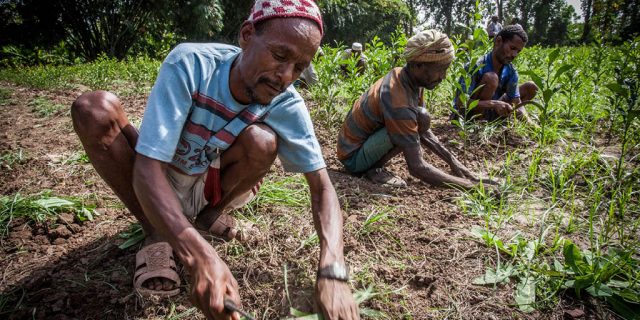
What do you know now that you wish you could tell your 18-year-old self?
- Take your time in college to learn in your classes and even take the least amount of classes per semester as a full time student so you can dedicate the rest of your time to extra-curricular activities or traveling abroad or even inside your state, getting to really know your communities. I did some of this but always had this obsession with finishing early. College should be a time to prepare yourself, not a step towards something. Nothing’s waiting for you after you climb down that hill during graduation, unless you’ve built up enough experience outside of the classroom.
-
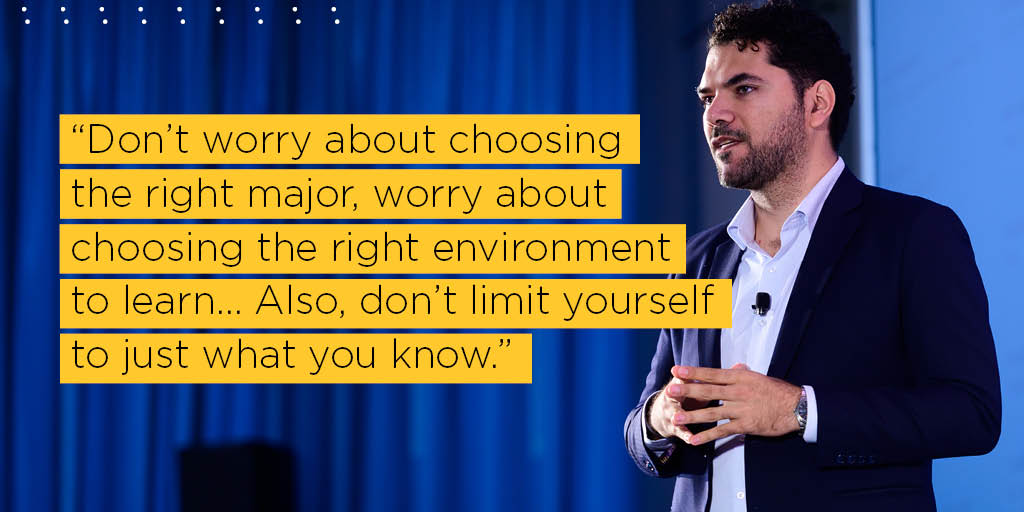 Don’t worry about choosing the right major, worry about choosing the right environment to learn and, yeah, it helps if your major is something you like and is something you can grow with (that you can continue to learn because it’s an evolving space). Also, don’t limit yourself to just what you know. In the J-School, they asked us to have a minor or several electives. I think this is great advice. If you like economics, take a minor in engineering, or law. If you like art, take a minor in education. Those who cross boundaries are more likely to find or create work. And the worst thing that can happen is you met different people than you’re comfortable with.
Don’t worry about choosing the right major, worry about choosing the right environment to learn and, yeah, it helps if your major is something you like and is something you can grow with (that you can continue to learn because it’s an evolving space). Also, don’t limit yourself to just what you know. In the J-School, they asked us to have a minor or several electives. I think this is great advice. If you like economics, take a minor in engineering, or law. If you like art, take a minor in education. Those who cross boundaries are more likely to find or create work. And the worst thing that can happen is you met different people than you’re comfortable with. - It’s important to do well in your classes but what will really set you apart is what you do outside of class: journalism club, working for the radio station, study abroad trips. Everybody can get As in school with enough work, not everybody can lead or create extracurricular organizations.
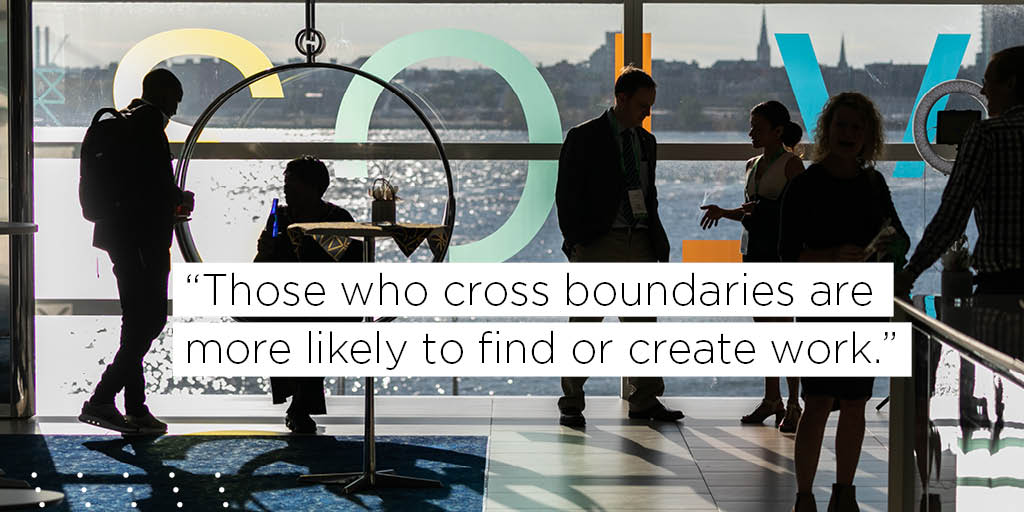
- Don’t be afraid to make mistakes. This is the time to make them and make as many as possible, so you don’t make them later.
- Don’t lose sight of your roots and your family. College can go by in a flash and your family time with it and then you’re off to who knows where. Make time every year for family and be fully in the moment. College will still be there when you go back.
What’s your best career pro-tip?
Carve yourself a role within the organization, one that is not in your job description, and become the go-to person for something.It will give you responsibility because only you will be responsible if that one thing fails, and it makes you unique. Because of my journalism background, I was the go-to person for editing reports at my first UN gig. That meant everything that we proposed to the world went through my desk, a junior officer’s desk. That also meant I learned every statistic, name, terminology, enough to sound knowledgeable and to start supporting the director in meetings.
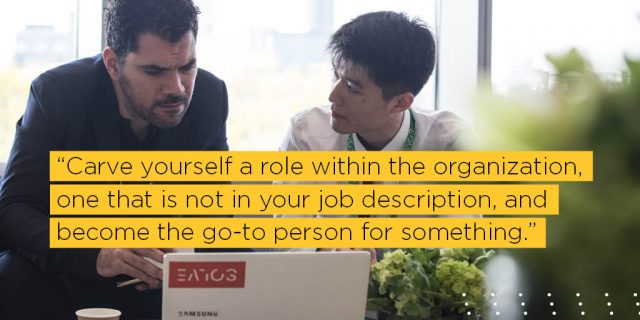
How did your KU degree prepare you for your current job?
It’s shocking how much I’ve used from my days at KU, because at KU I didn’t plan on joining the UN for humanitarian response work. A good writer, researcher, and analyst is always in demand, in any job.And while nobody cares if you say that during an interview, it will come in so handy that people will rely on you later. I can’t count the times I referenced my editing class for emergency situation reports. If you got one number wrong, 2,000 people might go to bed hungry during the emergency or you’d deliver too much salt (I made that mistake in the last emergency but caught it just in time before we sent several extra lorries of salt).
Interviewing, getting at the truth, translating number-heavy content into digestible policy memos, working long nights under pressure. These all sound like a reporter’s regular skill-set but I used all of these on all my missions with the UN to support people in need. At global and international studies, I learned to develop long papers, which is a lot of the work at the UN. I wrote at least 15 reports, more than a dozen pages long, collaborating, interviewing, coordinating data gathering. All the things I learned to do on various topics at global and international studies.
Finally, skimming. The glorious art of skimming through 200 pages of text that global and international studies drills into you so well because that’s the only way to get through several academic papers per week. At the UN I reviewed about 100 pages of information per week, some of it within minutes of a teleconference. It’s a skill you should never underestimate. Information is gold and the people who can transact the quickest with that gold are incredibly valuable.
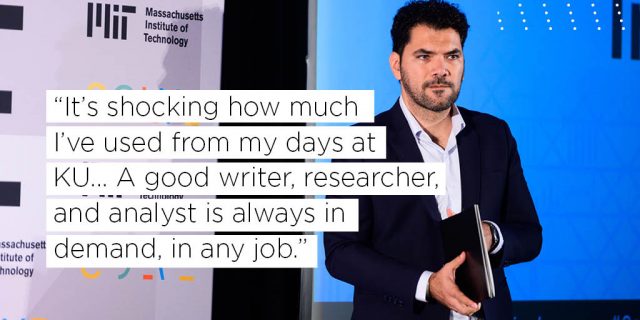
What do you do after you’ve clocked out?
Back in the UN days I’d go out to eat with friends from the humanitarian community (we were a tight group anywhere you landed) or I’d go read somewhere. We were constantly on missions everywhere so when all the friends/colleagues would be in the same city we’d party until karaoke late in the morning or whatever that city offered. It was really a family. Now, at MIT, I cycle to the river and hang my hammock and read until the sun sets or just cycle somewhere new far from work. I think I’m digging solitude a lot more after so much interaction.
What is a fun fact about you that surprises people?
I’ve been DJing now for 17 years thanks to KJHK. I’ve DJd in some unexpected places because I always bring my little mixer when I’m deployed for a long time.I did a party in a parking lot, a month after a Category 5 hurricane ripped through the Philippines. We were all exhausted and the first wave of responders was leaving so we went all out. We a great dance party with fried chicken.
I had a DJ residence in Guatemala, one in Rome in a little art gallery, and in Asia I got to DJ in some wonderful places. I love seeing people’s reactions to very different music that they’re not used to hearing.
Be like Carlos. Carve out a unique role for yourself. For more information, visit the Center for Global & International Studies, the William Allen While School of Journalism and Mass Communications, and KJHK at the University of Kansas. Also, explore Solve at the Massachusetts Institute of Technology (MIT) and the World Food Programme (WFP).
Hawks to Watch are disrupters. They’re poised for greatness, inspiring their colleagues and excelling in their professions. Basically, they’re killing it. Having recently graduated, they are just starting to leave their mark and we can’t wait to see how their story unfolds. These Jayhawks span all industries including business, non-profits, tech, healthcare, media, law and the arts.